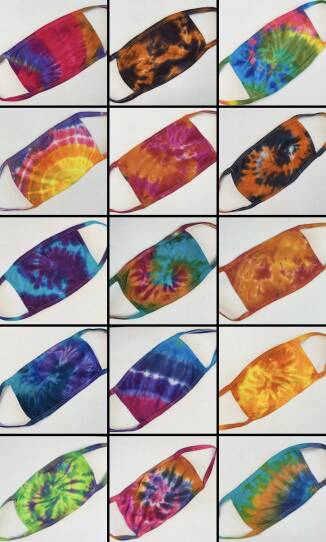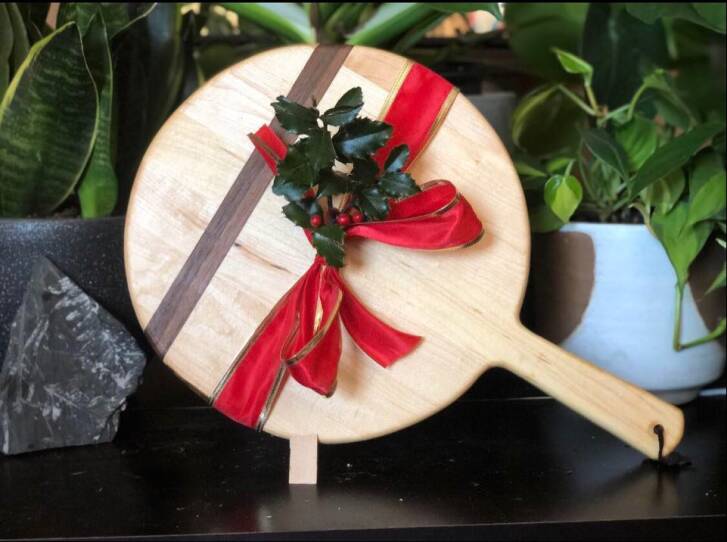The year 2020 has been a challenging one for musicians. With venues shuttering, tours halting, and fewer musicians having access to recording spaces (not to mention, face time with their bandmates and collaborators) it's become difficult to make ends meet. Still, the desire for a creative outlet is strong, leading many local musicians to find inventive and profitable side projects to help close income gaps caused by the pandemic.
Blues and soul singer-songwriter Julie Rhodes started a tie-dyeing business called The Electric Dye Co. , a venture fueled by her fear for her band's financial stability. The Electric Dye Co. is made up of full-time musicians and music teachers whose lives — and livelihoods — came to a halt due to the pandemic.
"We played a live stream show back in March, and I had the idea of doing a special run of tie-dyed tees to help raise money for my band," she says. "People were super supportive of what I was doing, so it kind of grew from there."

The Electric Dye Co.'s first big success was making tie-dyed shirts for the Newport Folk Festival, which sold out in under an hour. From there, Rhodes and her business partner Erin Parsons began to tie-dye shirts, dresses, tote bags, dish towels, facemasks, and other items. They're keeping everything local, using locally-sourced dye and thrifted items, and are giving back where they can. Rhodes and Parsons have already donated a portion of their profits from The Electric Dye Co. to both The Loveland Foundation and the Newport Festivals Musician Relief Fund .
Rhodes also started screen printing, a trade that she's dreamed of doing since before making music. She's still in the process of learning and tells me she's using her newfound time to do just that. "In a way, losing my jobs as a result of the pandemic actually helped me to be able to work on something I've always wanted."
After live shows were cancelled and a furlough came, Dave Zielinski of the Worcester-based band Square Loop began woodworking. He felt a push to take on a new project and found inspiration from woodworking artists on social media. Zielinski ultimately opened an Etsy shop, DaveZDesigns , where he sells a variety of handmade artisanal cutting boards and coasters.
Zielinski likes to experiment and prioritizes using local materials. His wood is sourced from a lumber yard in Connecticut, and the leather lace he uses on his boards comes from Alan James Co . in Worcester. He says that, for now, his aunt makes the mineral oil beeswax he uses to coat his wood creations, but he plans to transition to using wax from Hillcrest Apiary in Worcester.

Zielinski tells me he's learned a lot more than simply a new trade; woodworking also involves a lot of patience and troubleshooting. "It's always a challenge when something doesn't go exactly according to plan," he says. "There could be a knot in the wood, or something breaks, and you have to rethink and remake stuff." But Zielinski believes it's all part of the process that makes his projects more interesting. Every piece winds up being unique from the last.
Rafael Natan, who performs under the name Flight or Visibility , has had a part-time job ever since working as a freelance musician. "I've worked in an escape room, I've worked as a house manager at a concert hall, I've done anything that people will hire me to do," they tell me.
Natan is happy to do a variety of jobs, but their passion is in music education. They have experience teaching and assisting through the Boston Children's Chorus, Boston Public Schools, the New England Conservatory, and other local music programs. When the pandemic hit, Natan sought a low-risk way to do the work they love, and started working for a small summer program at a church, then ventured into private childcare and tutoring.
"It was really empowering to take my classroom management skills out of the classroom, and really let the kids lead what they wanted to do, and not feel so obligated to teach them specific things," they tell me.
Natan also started teaching online cooking lessons when widespread food and grocery shortages became a significant concern. The ultimate goal was to make people self-sufficient in lockdown.
"I got someone to cook a dish who did not have a peeler or cooking oil, and we made it work," they say about a specific cooking lesson. "I was trying things out alongside them, trying to peel a carrot with a spoon, and found that that could work."
Other musicians have found not only new sources of income but also outlets for creativity and even activism throughout this challenging year. Saxophonist Callum Mackenzie started the Quarantine Cafe livestream series while also writing video game reviews. Musicians Amanda Lozada and James Ikeda, who performs as The Michael Character , have been diving deeper into their work with Bummer City Historical Society , which hosts a variety of virtual events and prioritizes civic engagement, creating guides on housing rights and local elections.
"We want to create resources that are accessible, and that can be built on by others, maybe ourselves in the future," Ikeda says.
All of the musicians with whom I spoke are looking forward to the return of live music, but also plan to keep their side projects going after the pandemic subsides. Some are even considering growth opportunities. Rhodes says she will continue to donate profits from The Electric Dye Co. to organizations in 2021 as her business continues to grow. Zielinski is starting to figure out how he can make time for DaveZDesigns post-pandemic. "It's tough right now, but it's definitely cool to be able to do something creative that's a little bit outside of the realm of what I'm used to," he says.





